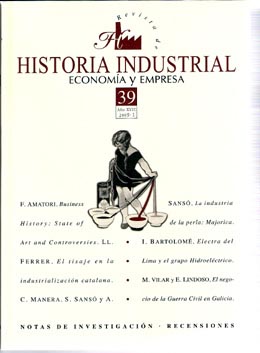El beneficio de los tejidos. La empresa Berenguer y Cía., de Artés en la industrialización catalana
Paraules clau:
Tisaje, Contabilidad industrial, Beneficios industriales, Burguesía catalanaResum
En este trabajo se aborda en primer lugar el papel del tisaje en la industrialización catalana. Después de la mecanización de la hilatura se produjo entorno a 1840 una expansión del tisaje manual en forma de fábricas de tejidos especializadas, algunas de las cuales evolucionarían hacia la mecanización y otras se mantendrían en la producción de tejidos difíciles de mecanizar. En segundo lugar, y a partir del análisis de la contabilidad de la fábrica de la familia Berenguer de Artés, se señala la gran capacidad de acumulación de la industria textil y como la familia pasó de simples tejedores manuales en 1840 a formar parte de la burguesía catalana a principios del siglo XX. Los estudios sobre beneficios en la industria textil de que disponemos señalaban escasos beneficios, mientras que el caso estudiado demuestra que la industria de tejidos fue extraordinariamente rentable en el último tercio del siglo XIX lo que permitió a una familia de un pueblo del interior construir una fábrica totalmente mecanizada en Artés, una colonia industrial en Cabrianes y vivir con el lujo de la burguesía catalana en Barcelona.Descàrregues
Descàrregues
Publicades
Com citar
Número
Secció
Llicència
The author assigns all rights to the publisher. Creative Commons
The author who publishes in this journal agrees to the following terms:
- The author assigns all intellectual property rights exclusively to the publisher for the entire duration of the applicable intellectual property rights.
- The publisher will distribute the texts under the Creative Commons Attribution License, which allows others to share the work, provided that they acknowledge the authorship, its initial publication in this journal, and the conditions of the license.





